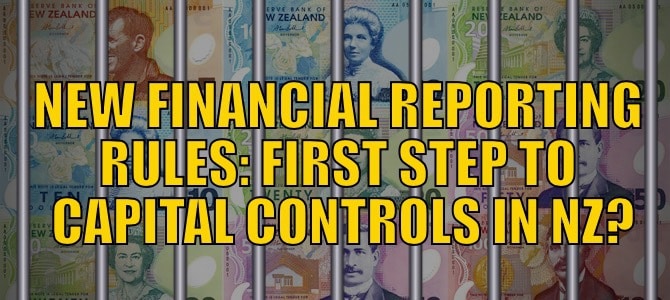The financial privacy of New Zealanders is to be further eroded this year. But could this also be the first small step in capital controls being implemented in New Zealand?
New Banking rules set to come into force in November will mean any cash transactions over $10,000 will have to be reported to police by New Zealand banks.
On top of this banks will also have to alert the Police Financial Intelligence Unit of all international wire transfers from New Zealand of only $1000 or more.
The customer details given to police by the banks will include “names, account numbers, types and amounts of funds, locations, addresses, phone numbers, and “any other identifying information”.
Government Will Have Access to Screeds of Personal Information “Just in Case”
This of course is all in the name of fighting money laundering and stopping the financing of terrorism.
But as New Zealand Council for Civil Liberties spokesman Thomas Beagle said:
“Police are doing this more and more because they can, rather than because they need it . . . It’s concerning the Government will have access to all this personal information, just in case they need it.”

As is often the case, new rules and regulations aimed at cracking down on a suspect few, usually do little to stop them. Instead the “bad guys” come up with more inventive ways to achieve their aim.
Meanwhile the result is less financial privacy for the average person on the street.
Look at a somewhat related issue of the capturing of vast amounts of digital communications by the “Five Eyes” nations which includes our own government. Do we have significantly less terrorist attacks globally as a result of all this data? We highly doubt it. Maybe just the opposite?
Our guess is that more data on financial transactions will also not have a significant impact on the “bad guys”.
“Nothing to Hide, Nothing to Fear?”
Discuss this at a dinner party and you’ll likely hear the refrain “Well, if you haven’t got anything to hide, you’ve got nothing to worry about”.
But that is not the point. Sure, if there is evidence someone has broken the law then by all means investigate them.
But why does the government need what will in fact be vast screeds of financial data from ordinary law abiding New Zealanders?
Imagine just how many international transfers of $1000 or more are made every day from New Zealand banks. We doubt even a tiny percentage are for nefarious reasons.
The Office of the Privacy Commissioner stated “that any collection of citizens’ data “should have a clear purpose, and the data collection should be proportional”.
Surprisingly however, it said the new regulations “appeared to meet that threshold.”
The “clear purpose” according to the police Financial Intelligence Unit is to “further build an intelligence picture across the entire financial system and “identify any suspicious looking activity or patterns”.
So basically just gather vast swathes of data to identify the few suspicious transactions amongst them.
Another key point not mentioned anywhere is that it is the multinational banks that have in fact been the biggest enablers of money laundering rather your “average Joe or Jane”. Just google “bank fined for profiting from money laundering” and you will see an extensive list of news items describing large well known banks profiting from so called “dirty money”.
Could These New Rules be the First Step to Capital Controls in New Zealand?
A reader (thanks Michael) commenting on the NZ Herald article said, “I guess you heard in the news about the reporting requirements for foreign transactions over $1,000. I think this is the first step towards capital controls.”
(Capital controls simply mean the Government restricts or caps the flow of money out of a country. Usually this happens in a time of financial crisis when capital is leaving a country in a hurry).
So is this an outlandish comment to make?
We live in a free country. Capital controls would never be put in place here right?
Well just over a year ago we commented on the possibility of capital controls in New Zealand:
“…the NZ economic system was once much more closed than it is today. “New Zealand retained capital controls up until late 1984.” (Source).”
Commenting further in that same article, we said:
“The idea of capital controls in New Zealand may seem far fetched to most. However maybe not? Even the NZ Treasury website features the abstract of a guest lecture from 2012 by an Associate Professor from Wellington’s Victoria University Business School headed:
So these ideas are at least being discussed within the halls of government here too.”
This same article also discussed the 4 different types of capital controls that governments implement.
These new reporting requirements on foreign wire transfers, fit rather closely with one of these measures in particular:
“Restrictions and Regulations
A government might restrict how much foreign currency or gold you can own, import, or export. It might require you to get permission to take a certain amount of money out of the country. The cap is often only a couple thousand dollars.”
In order to stop capital from leaving a country, you first need to know how much is leaving.
So the government requiring the banks to collect and report all this financial information, means that it would be even easier for the government to then require the banks to stop any international wire transfers above a certain limit.
Perhaps capital controls in New Zealand are not necessarily just around the corner. But this new information would likely make them much easier to implement.
Latest Update 2018: All $10,000 Cash Transactions and $1,000 International Transfers Now Reported to N.Z. Police >>
Related content you might like to read: War on Cash – Implications for New Zealand >>


“Well, if you haven’t got anything to hide, you’ve got nothing to worry about.”
And this is why governments are so often secretive.
Pingback: Here’s Proof the NZ Government is Following the IMF’s “War on Cash” Doctrine - Gold Survival Guide
Pingback: Financial Martial Law: Does NZ Have Similar Financial Reporting Regulations? - Gold Survival Guide
Pingback: 4 Reasons You Should Store Some Precious Metals Outside of New Zealand - Gold Survival Guide
Pingback: All $10,000 Cash Transactions and $1,000 International Transfers Now Reported to N.Z. Police - Gold Survival Guide
I have family in Philippines who are getting old and now are needing medical treatments in hostbital.It is user pays over there and im finding it increasingly dificalt to send money over. The hoops i am now haveing to jump through has goten ridiculouse.$1500 is an insignifican amount to send BUT its a huge amount there and is saveing my brothers life.How much is a terorust amount ? How much is a money lundering amount ? These are the questions the govt.nz should be asking themselves.Not 1500 or 20000 bucks.I will be moveing back permanently one day and im shaking in my boots as to what i will be faceing when i move my savings over.
Hi Bruce, Yes it has gotten quite ridiculous the hoops to be jumped through for what are as you say relatively small amounts of money. It makes you wonder is this really to stop the “terrorists” or more about tracking movements of money?